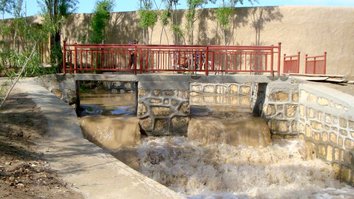INJIL DISTRICT, Herat Province, Afghanistan -- Haji Abdul Karim, 57, soaks his scarf in water and puts it on his head on this hot day. He walks towards a canal intake gate, his gray shirt wet with sweat. He clears the canal of any trash and shovels the gravel out from its bottom. He is tasked to inspect the canal daily to make sure it is clear and free of leaks.
"In the past, there were 70 people assigned on a daily basis in the winter to clear the canal and prepare it for irrigation," Haji Abdul Karim said. "Now I am the only person responsible for cleaning and taking care of the canal. There is no need for scores of people to clear it anymore." Every month one of the villagers volunteers to clean the canal.
Haji Abdul Karim is a farmer in Kushk-e-Baad-e-Saba village in Injil District in Herat Province. He cultivates mainly wheat on his farm of 20 jeribs (40,000 square metres). The rehabilitated irrigation canal has allowed him to irrigate larger tracts of land, and he is now able to cultivate all of his farmland, compared to only 15 jeribs previously.
Prior to the rehabilitation of the canal, Haji Abdul Karim and his fellow villagers were able to irrigate only a part of their land because of water wastage. Villagers blocked the flow of water with sandbags to divert the water to their own farmlands. This became a lengthy process in which much of the water was wasted. Today, it only takes a few minutes to open or close one of the newly built metal intake gates along the canal to direct water toward a tract of farmland, preventing any water loss along the way.
![Built by the On-Water Farm Management Project, the canal stretches 3,315 metres and benefits more than 330 families. The reconstruction cost was about 6.7 million AFN (about US $96,500). [Rumi Consultancy/World Bank]](/cnmi_st/images/2016/12/21/6850-st2-585_329.jpg)
Built by the On-Water Farm Management Project, the canal stretches 3,315 metres and benefits more than 330 families. The reconstruction cost was about 6.7 million AFN (about US $96,500). [Rumi Consultancy/World Bank]
"My crops suffered and I could only cultivate half of my land," recalls farmer Mohammad Yasin, 75. "Now I can easily irrigate all 15 jeribs of land. Our economic conditions have improved. We earn enough to put food on our tables and, with God's help, do not depend on anyone else."
The reconstruction project, which included the building of the intake gates, in Kushk-e-Baad-e-Saba village took 10 months to complete and was finished in September 2014. Built by the On-Farm Water Management Project (OFWMP), the canal stretches 3,315 metres and benefits more than 330 families. The reconstruction cost was about 6.7 million AFN (about US $96,500).
With a US $25 million (1.7 billion AFN) grant from the Afghanistan Reconstruction Trust Fund (ARTF), OFWMP works to improve agricultural productivity in project areas by enhancing the efficiency of water use. It is implemented by the Ministry of Agriculture, Irrigation and Livestock (MAIL).
The project aims to support on-farm water management investments in five regions -- Kabul, Baghlan, Herat, Nangarhar and Balkh provinces -- covering a total of 19,000 hectares. OFWMP has implemented 35 projects in western Afghanistan, especially in Herat Province, since it began operating in 2011.
Adopt best practices
OFWMP also trains farmers on best practices in irrigating their farmlands to ensure the proper use of the irrigation system. After a canal is built or rehabilitated, one of the fields in the village is leveled to demonstrate best practices in leveling farmland and facilitating better and faster irrigation.
"We used to dig deep runnels that made it difficult for our crops to get proper irrigation. Some parts of our land were over-irrigated while other parts were left dry," said Mohammad Yaqoub, 45, head of the irrigation association in Kushk-e-Baad-e-Saba village. "The training taught us how to level our farmlands, which resulted in equal irrigation to all parts."
The rebuilt canal and training have allowed villagers to spend less time and energy on irrigation.
"In the past, I could irrigate my farmland only once every 25 days and it took three hours for all of my land to be irrigated," said 51-year-old Bismellah. "Now I can take my turn every eight days, and it takes only 90 minutes for my farmland to be completely irrigated. At the same time, the harvest from my crops has increased from 320kg of wheat per jerib of land to 380 to 400kg."
[The World Bank Group authorises the use of this material subject to the terms and conditions on its website, http://www.worldbank.org/terms.]

![A World Bank project aims to support on-farm water management investments in five regions -- Kabul, Baghlan, Herat, Nangarhar and Balkh provinces -- covering a total of 19,000 hectares. [Rumi Consultancy/World Bank]](/cnmi_st/images/2016/12/21/6849-st1-585_329.jpg)







It is a good program. If such projects get implemented in the Pashtun populated provinces too, the people will themselves stop fighting. Now, most of the people join the armed groups due to joblessness and hunger and fight against the government.
Reply1 Comment